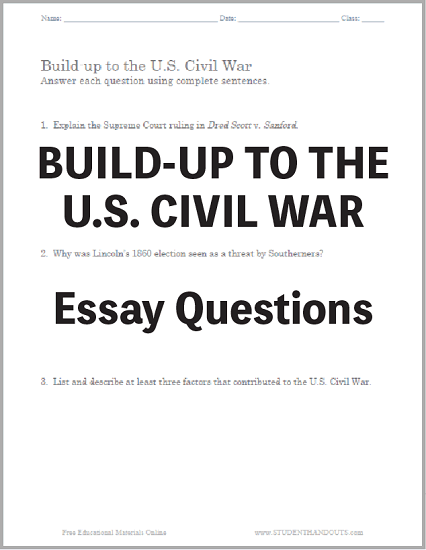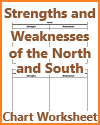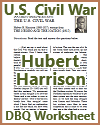| Build-up to the U.S. Civil War Essay Questions |
|---|
| www.studenthandouts.com ↣ U.S. History ↣ U.S. Civil War ↣ U.S. Civil War Worksheets |
 |
    |
|
Click here to print. Answers will vary. 1. Explain the Supreme Court ruling in Dred Scott v. Sanford. In the 1857 Dred Scott v. Sanford decision, the Supreme Court ruled that African Americans, whether enslaved or free, were not U.S. citizens and therefore could not sue in federal court. The Court also declared the Missouri Compromise unconstitutional, asserting that Congress had no power to ban slavery in the territories. This ruling intensified national divisions over slavery. 2. Why was Lincoln's 1860 election seen as a threat by Southerners? Southerners viewed Lincoln's 1860 election as a direct threat to their way of life. Although he pledged not to interfere with slavery in existing states, his Republican Party was firmly opposed to its expansion into new territories. The South believed this would put slavery on a path to ultimate extinction, giving them the political incentive to secede rather than accept permanent minority status. 3. List and describe at least three factors that contributed to the U.S. Civil War. Three primary factors contributed to the U.S. Civil War. First, the debate over slavery's expansion into new territories created irreconcilable sectional divisions. Second, the concept of states' rights was invoked to defend the institution of slavery and oppose federal authority. Third, the growing economic and social differences between the industrial North and the agrarian, slave-based South fostered a sense of separate identities and conflicting interests. Abraham Lincoln's election as President in 1860 was seen as a threat by many Southerners for several key reasons. Opposition to Slavery Extension: Lincoln and the Republican Party had made opposition to the extension of slavery into new territories a Central plank of their platform. While Lincoln and the Republicans did not advocate for immediate abolition of slavery in the Southern states where it already existed, they were determined to prevent its expansion into the western territories. This stance alarmed Southerners who were committed to the preservation and expansion of slavery. Fear of Republican Dominance: The Republican Party was primarily a Northern party, and Lincoln's election marked the first time that a Republican had won the presidency. Many Southerners perceived this as a sign that the North's political and economic interests would dominate the federal government. They believed that Republican control of the presidency and Congress would lead to policies unfavorable to the South. Secessionist Sentiment: Even before Lincoln's election, there was a strong secessionist sentiment in some Southern states. The fear that a Republican president would curtail slavery and Southern influence at the federal level fueled the movement for secession. Perceived Threat to Slavery: Many Southerners viewed Lincoln as a threat to the institution of slavery itself. They believed that his election was a step toward the eventual abolition of slavery, despite Lincoln's assurances to the contrary. Some Southern leaders openly declared that secession was necessary to protect the "peculiar institution" of slavery. Distrust of Northern Abolitionists: Southerners often conflated Lincoln's election with the more extreme views of Northern abolitionists who advocated for immediate and total emancipation. They feared that these abolitionists would gain influence in the federal government and push for anti-slavery policies. Concerns About Economic Impact: Slavery was not only a social and political institution in the South but also a crucial part of its economy, particularly in the cotton-producing states. Many Southerners worried that Lincoln's policies would negatively impact the Southern economy by restricting the expansion of slavery or imposing tariffs that could harm Southern trade. Regional Identity and Autonomy: Southerners had a strong sense of regional identity and autonomy. They believed that they had the right to govern themselves as they saw fit, including the right to determine their own stance on slavery. Lincoln's election was seen as a threat to that autonomy and the ability to make decisions on issues like slavery independently. In the months following Lincoln's election, several Southern states, starting with South Carolina, voted to secede from the Union. These actions marked the beginning of the U.S. Civil War, as the secessionist states formed the Confederate States of America and tensions between the North and South escalated into armed conflict. Lincoln's election and the Southern reaction to it were pivotal events in the lead-up to the Civil War. |
| www.studenthandouts.com ↣ U.S. History ↣ U.S. Civil War ↣ U.S. Civil War Worksheets |














































